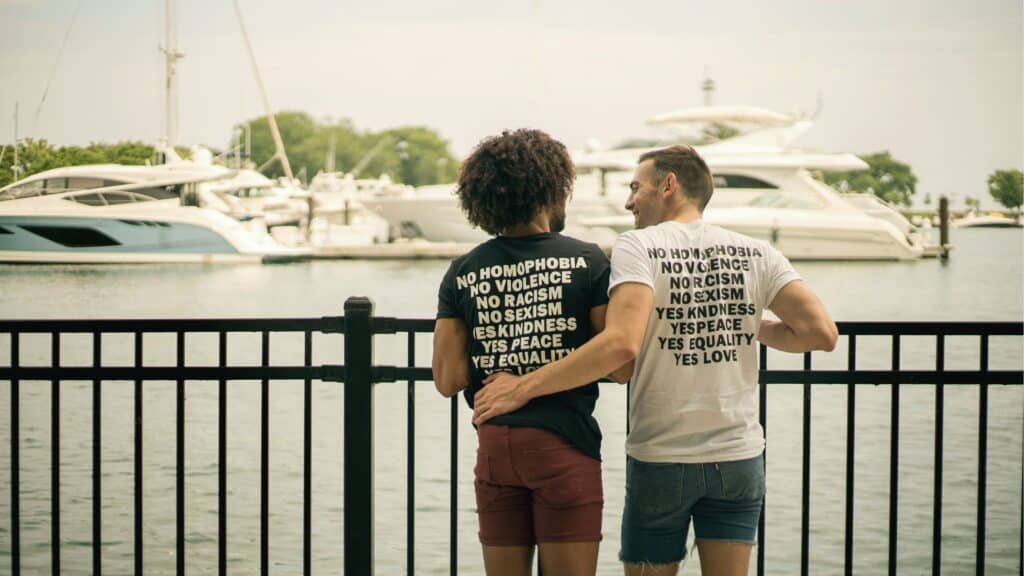As Pride Month comes to a close, let’s remember to always celebrate love in all forms.
For many people, Pride Month serves as a yearly reminder to honor their sexuality and individuality in all forms. Pride month is also a time for people in the LGBTQIA+ community to celebrate love, freedom, and rights, as the world appreciates how far they’ve come.
For those who are still exploring their sexuality and gender identity, officially coming out to friends and family might have crossed your mind once in a while. Identifying yourself as an LGBTQIA+ later in life can sometimes make coming out in adulthood a daunting challenge to face, especially if you feel the people around you won’t be able to accept it.
In this article, we tackle each and every issue to help you see the beauty of coming out, even if you think it might be too late for you.
What is coming out, and why is it important?
The term “coming out” refers to the process of internally accepting and sharing one’s LGBTQIA+ identity with others.
It is a very personal experience that is different for everyone. Some may find it easy to come out, while others may struggle with it for years.

Image by Nicholas Swatz via Pexels
Coming out allows people to live more authentic lives. Having to hide your sexual identity, which is such an essential part of your physical, emotional, and social make-up, can be exhausting and damaging to your mental health.
It also helps create a more inclusive world for everyone, regardless of sexual orientation or gender identity, by breaking down barriers and stereotypes.
Having said that, whether you decide to come out or not is entirely your choice, and you don’t have to decide today.
Just like there isn’t one single profile of an LGBTQIA+ person, as it covers such a diverse group, there isn’t one single way to come out.
It’s a uniquely personal experience. What’s most important is to do it in a way that feels safe and comfortable for you.
I want to come out, but I don’t know how. Any advice?
First of all, congratulations! Coming out is not easy; know that it is a courageous thing to do.
Once you’ve decided to come out, here are a few things you might want to consider:
Take as much time as you need.
This is your process, and you might still be figuring out your own identity. There is no rush, and it’s likely that coming out won’t be one single event but rather a journey.
Create a plan.
This means considering who you want to come out to and when and how you want to do it. However, bear in mind that plans don’t always work out, and once you put it out there, you might not be able to control who knows.
Coming out should always be a choice made by the individual, not something that is forced upon them or done without their consent, but be prepared for the possibility that it won’t always be in your hands.
Find support.
Who can you rely on for emotional support during this process? If you’re feeling scared or alone, know that there are many people who have been in your situation and can offer advice and support. There are also numerous organizations, online resources, and helplines available if you need someone to talk to.
Gather your thoughts.
Before you come out, you might want to think about what you want to say and how you want to say it. This can help you to clarify your thoughts and make the conversation go more smoothly, but again, remember that things might not always go according to plan.
You don’t have to come out to everyone at once.
But you can if you want to! Some people decide to come out on social media and tell everyone at once. Others take a more gradual approach, coming out to close friends and family first and then gradually expanding their circle.
There is no right or wrong way to do it – it’s entirely up to you. Go at your own pace and be gentle with yourself throughout the process.
Prioritize your mental wellbeing and your safety.
This includes both your emotional and physical safety. Coming out can be tough mentally and physically, so make sure you’re in a good place before doing it.
As someone coming out in adulthood, what should I expect?
In the last years, as society has become more accepting and legislation has progressed, coming out has become easier for many people. That’s why the younger generations are coming out at a much earlier age.
A recent Gallup poll shows that 7.1% of Americans identify as something other than heterosexual, a sharp increase from 5.6% in 2021. But whereas close to 21% of Generation Z, born after 1997, identify as LGBT, only 2.6% of baby boomers (born in 1946-1964) identify as LGBT, with the percentage going down to 0.8% to those born before that.
However, while it’s becoming easier for many to come out, it’s still a very personal decision, and not everyone feels comfortable or able to do it.
If you’re an adult planning to come out, the most important thing to remember is that it’s never too late.
You’re ready when you’re ready, so don’t feel that you’ve missed your chance or that you’re too old.
There are many benefits to coming out at an older age, as many feel more comfortable in their own skin as they age and are more financially independent.
Of course, there can also be challenges, such as dealing with other people’s reactions, especially with longtime friends and family who might not be as accepting. You might also feel that you’ve missed out on opportunities by not coming out sooner.
But ultimately, by deciding to come out, you’re taking control of your life and claiming your true identity.
And that is always a brave and empowering decision at any age.
How should I prepare myself for it?
Some of the ways that you can prepare yourself for coming out are:
- Talk to someone who has already been through the process and can offer advice and support. This will make you feel less alone and help you envision what your life could be like after coming out.
- Think about what might happen after you come out. This includes both the positive and negative outcomes. What are the risks and potential consequences? What are the benefits? What would make it easier for you, and what would make it more difficult? Thinking through these scenarios will make you feel better prepared and more confident.
- Reach out for support. This can include support groups, LGBTQIA+ communities, local or online groups, helplines, or therapists. Talking to someone who understands what you’re going through can be a huge help, and you might benefit from professional help, especially if you’re struggling with anxiety or depression.
- Know your rights. If you think you could face a delicate situation, such as discrimination at work, or potential divorce or custody issues, it’s important to know your rights. This way, you can be prepared for the worst and won’t be blindsided if it comes to that.
Above all, remember that you have absolutely nothing to be ashamed about.
Coming out and having conversations with the people in your life about your sexuality can be difficult. Still, don’t forget that even if any difficult feelings come up for you at any point, you are doing nothing wrong.
You have the right to live your life authentically and without apology.
How should I prepare my family and loved ones?

Image by Uriel Monte via Pexels
When you’re getting ready to come out to your loved ones as an adult, they’ll likely need some time to adjust to your new identity.
It’s human nature to project our fears and anxieties onto those we love, so you might need to be patient with them as they process the news.
You might want to start by coming out to those closest to you first, or those most likely to be accepting, and then gradually work your way out to those who might be more challenging.
It’s also a good idea to let them know what you would like them to do to support you and what you would appreciate them not doing. This will help avoid any hurt feelings or misunderstandings down the road and make the process of coming out easier for you both.
When it comes down to it, know that you’re not responsible for anyone else’s emotions, so don’t put pressure on yourself to make them happy or comfortable.
The only thing you can do is be honest and authentic and let them know that you’re still the same person you were, just with a different orientation.
I have a straight partner, how can I prepare him/her?
Coming out to a straight partner is likely one of the most difficult conversations you will have.
Make sure that you give the conversation the space and time it needs. Set aside a special time for it when you’re feeling ready and where you’re not going to have distractions or time pressure.
Your coming out might come as a shock, and your partner might feel that they’ve been lied to as the dynamic of the relationship shifts. They will need time to navigate through their own feelings, so it’s likely that you’ll need to have several conversations with your partner.
Before you talk, be clear if coming out means that you want to leave them or if it doesn’t necessarily put an end to the relationship. Does your new sexual identity change how you feel about your partner?
You might want to consider couples therapy to help you both navigate this new stage in your relationship and have resources ready at hand.
How should I talk to my friends about it?
When you start thinking about coming out to your wider circle, it might feel daunting and emotionally draining to have to explain yourself to so many people.
Think about whether you want to have in-person 1:1 conversations, whether you would instead prefer to come out to a group of friends, or even do it online or via phone messages.
It can be helpful to come out to your more supportive friends first to ensure that you build a network of people you know will be there for you.
Remember that you can choose to end any conversation that makes you feel uncomfortable, whether online or in person.
If any of your friends react negatively or are not accepting of your new identity, it can help to have a script ready in your head of how you want to respond to stop the conversation right there.
Lastly, although your friends might have many questions for you, it’s not your responsibility to shoulder the burden of their curiosity or educate them on the LGBTQIA+ community and experience.
It can be draining to have to explain yourself all the time, so set boundaries and don’t hesitate to direct them to resources instead.
I feel unsafe coming out. What should I do?
First of all, know that you’re not alone.
If you’re feeling unsafe for any reason, make sure you gather your resources before you decide on your next steps to come out.
Be clear on what risks you could face from a physical, financial, and emotional standpoint if you come out, and establish plans to protect yourself.
There are national and local organizations that can help you through the process of coming out, so make sure you reach out to support groups and share your concerns.
If there are specific people that feel unsafe, consider whether you want to have an in-person conversation with them or not, and if you do, talk to them in a public place where you feel comfortable. You might also want to bring along a safe friend or family member for support.
One important point to remind yourself of during the process of coming out is that if someone doesn’t react the way you had hoped, they may just need time to process.
Their first reaction might not necessarily be forever, so don’t feel disheartened if they need some space and time to come around.
Other people’s reactions are more a reflection of their own internal beliefs and struggles than a reflection of you and how they feel about you. So hard as it may be, try to detach yourself from their reaction and focus on your own journey.
Ultimately, it’s your choice when, where, and how you come out.
You don’t owe anyone any explanations, so take as much time as you need and do it in a way that feels safest and most comfortable.
David Johns, the executive director for the National Black Justice Coalition, writes about moving beyond the idea of “coming out” and towards the concept of “inviting in,” and that “sharing essential parts of ourselves is an act of love and demonstration of truth.”
So celebrate your truth, take pride in who you are, and the strength it took for you to be where you are today.

